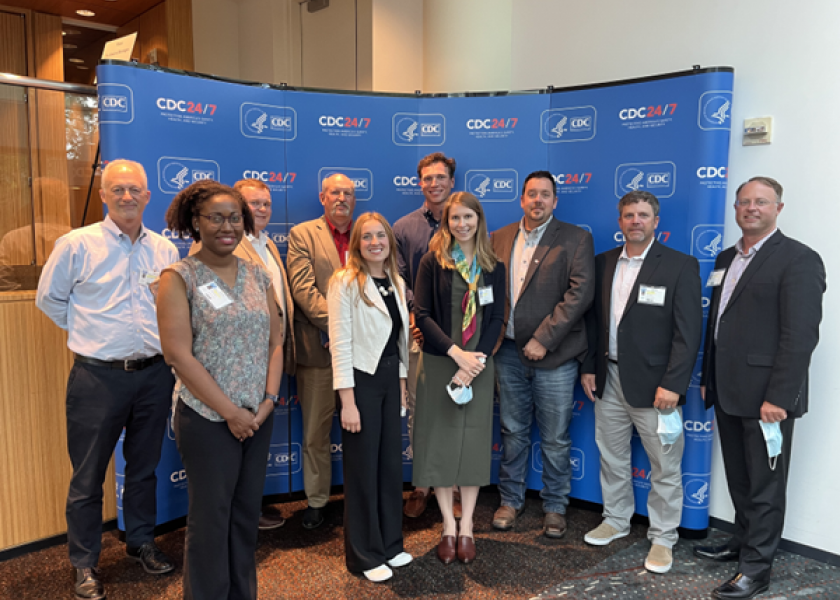National Institute for Animal Agriculture Partners with CDC

In August, The National Institute for Animal Agriculture (NIAA) hosted a group of ten farmers, ranchers, and veterinarians on a tour and engagement visit with the Centers for Disease Control and Prevention (CDC).
Each year the Cattlemen’s Beef Board designates Beef Checkoff funding to programming that includes research, foreign marketing, industry information, consumer information and safety. NIAA’s project was approved in 2021 with a plan to connect farmers and ranchers and industry professionals to CDC and other public health professionals to learn and engage on the importance of responsible antibiotic use in animal agriculture.
“The responsible use of antibiotics in animal agriculture is one of the most misunderstood topics in today’s food system,” said J.J. Jones, executive director of NIAA. “Farmers, ranchers and veterinarians face an ever-changing landscape of consumer demands without much needed constructive discussion or feedback.”
NIAA believes the future of animal antibiotic use will be shaped by consistent, effective communication and collaboration between the animal agriculture sector and its allies to combat antimicrobial resistance (AMR) through a One Health approach.
Megin Nichols, DVM, MPH, DACVPM, CDC Deputy Division Director, Division of Foodborne, Waterborne, and Environmental Diseases and co-chair of the NIAA antibiotics council, sees the mutual benefits to be gained from collaborative in-person sessions “The opportunity to meet in-person and share ideas through the NIAA engagement with livestock producers regarding the intersection of human health and animal health was invaluable to our team. It opened the door to dialogue and innovation on topics of mutual interest,” said Nichols. Dr. Nichols is a veterinarian employed by CDC and understands the lapse in knowledge with her public health colleagues.
Andy Bishop, a rancher from Kentucky, appreciated the opportunity to connect with leaders outside of the industry. “The CDC visit was a great opportunity to bring a multi-faceted group of individuals together in a collaborative effort to protect animal agriculture and the American population,” said Bishop. NIAA’s animal agriculture guests included:
- Allison Phibbs, Public Policy & Government Relations, Merck Animal Health
- Andy Bishop, Board Member, Cattlemen’s Beef Board
- Brandon Burks, Education Lead, Kentucky Beef Council
- Joe Lowe, Farmer and Rancher, Member, Kentucky Beef Council
- Josh Barnett, Farmer and Rancher, Member, Kentucky Beef Council
- Heather Fowler, DVM, MPH, PhD., Director for Producer and Public Health, National Pork Board
- Dave Moody, Farmer and Rancher, Iowa Select Farms
- Bruce Stewart-Brown, DVM, Sr VP of Technical Services and Innovation, Perdue Foods
- Taylor Spronk, DVM, Pipestone Veterinary
- J.J. Jones, Executive Director, NIAA
As an addition to the great collaboration in Atlanta, NIAA will be hosting a webinar for members and Qualified State Beef Council staff and members featuring Dr. Heather Fowler, Dr. Megin Nichols, and Andy Bishop on October 20 at 2 p.m. central. The webinar will share experiences from farmers, ranchers, and veterinarians, allow for a question-and-answer session and will discuss how we keep the conversation around antibiotic stewardship alive. To register, visit animalagriculture.org







